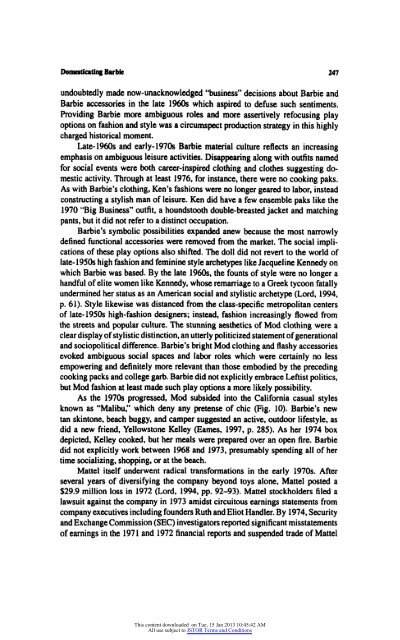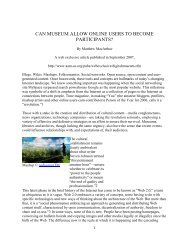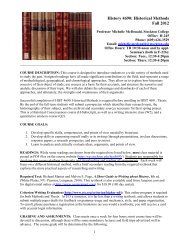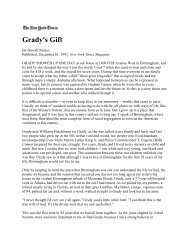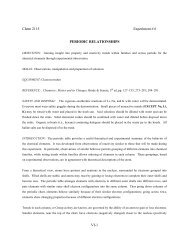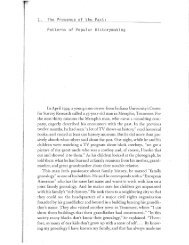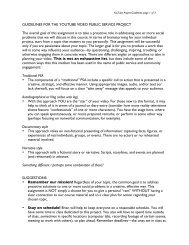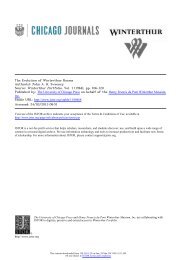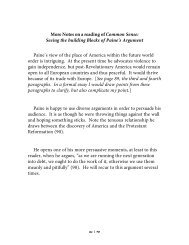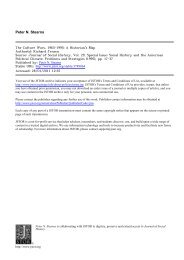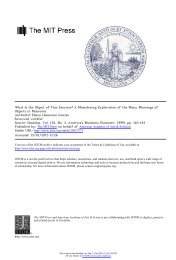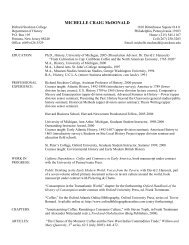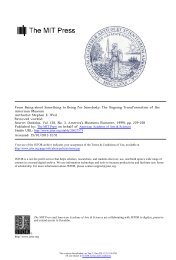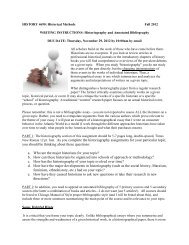Domesticating Barbie - Richard Stockton College Word Press ...
Domesticating Barbie - Richard Stockton College Word Press ...
Domesticating Barbie - Richard Stockton College Word Press ...
You also want an ePaper? Increase the reach of your titles
YUMPU automatically turns print PDFs into web optimized ePapers that Google loves.
<strong>Domesticating</strong> <strong>Barbie</strong> 247<br />
undoubtedly made now-unacknowledged "business" decisions about <strong>Barbie</strong> and<br />
<strong>Barbie</strong> accessories in the late 1960s which aspired to defuse such sentiments.<br />
Providing <strong>Barbie</strong> more ambiguous roles and more assertively refocusing play<br />
options on fashion and style was a circumspect production strategy in this highly<br />
charged historical moment.<br />
Late-1960s and early-1970s <strong>Barbie</strong> material culture reflects an<br />
increasing<br />
emphasis on ambiguous leisure activities. Disappearing along with outfits named<br />
for social events were both career-inspired clothing and clothes suggesting do<br />
mestic activity. Through at least 1976, for instance, there were no cooking paks.<br />
As with <strong>Barbie</strong>'s clothing, Ken's fashions were no longer geared to labor, instead<br />
constructing a stylish man of leisure. Ken did have a few ensemble paks like the<br />
1970 "Big Business" outfit, a houndstooth double-breasted jacket and matching<br />
pants, but it did not refer to a distinct occupation.<br />
<strong>Barbie</strong>'s symbolic possibilities expanded anew because the most narrowly<br />
defined functional accessories were removed from the market. The social impli<br />
cations of these play options also shifted. The doll did not revert to the world of<br />
late- 1950s high fashion and feminine style archetypes like Jacqueline Kennedy on<br />
which <strong>Barbie</strong> was based. By the late 1960s, the founts of style were no longer a<br />
handful of elite women like Kennedy, whose remarriage to a Greek tycoon fatally<br />
undermined her status as an American social and stylistic archetype (Lord, 1994,<br />
p. 61). Style likewise was distanced from the class-specific metropolitan centers<br />
of late-1950s high-fashion designers; instead, fashion increasingly flowed from<br />
the streets and popular culture. The stunning aesthetics of Mod clothing were a<br />
clear display of stylistic distinction, an<br />
utterly politicized statement of generational<br />
and sociopolitical difference. <strong>Barbie</strong>'s bright Mod clothing and flashy accessories<br />
evoked ambiguous social spaces and labor roles which were certainly no less<br />
empowering and definitely more relevant than those embodied by the preceding<br />
cooking packs and college garb. <strong>Barbie</strong> did not explicitly embrace Leftist politics,<br />
but Mod fashion at least made such play options a more likely possibility.<br />
As the 1970s progressed, Mod subsided into the California casual styles<br />
known as "Malibu," which deny any pretense of chic (Fig. 10). <strong>Barbie</strong>'s new<br />
tan skintone, beach buggy, and camper suggested an active, outdoor lifestyle, as<br />
did a new friend, Yellowstone Kelley (Eames, 1997, p. 285). As her 1974 box<br />
depicted, Kelley cooked, but her meals were prepared over an open Are. <strong>Barbie</strong><br />
did not explicitly work between 1968 and 1973, presumably spending all of her<br />
time socializing, shopping,<br />
or at the beach.<br />
Mattel itself underwent radical transformations in the early 1970s. After<br />
several years of diversifying the company beyond toys alone, Mattel posted a<br />
$29.9 million loss in 1972 (Lord, 1994, pp. 92-93). Mattel stockholders filed a<br />
lawsuit against the company in 1973 amidst circuitous earnings statements from<br />
company executives including founders Ruth and Eliot Handler. By 1974, Security<br />
and Exchange Commission (SEC) investigators reported significant misstatements<br />
of earnings in the 1971 and 1972 financial reports and suspended trade of Mattel<br />
This content downloaded on Tue, 15 Jan 2013 10:45:42 AM<br />
All use subject to JSTOR Terms and Conditions


